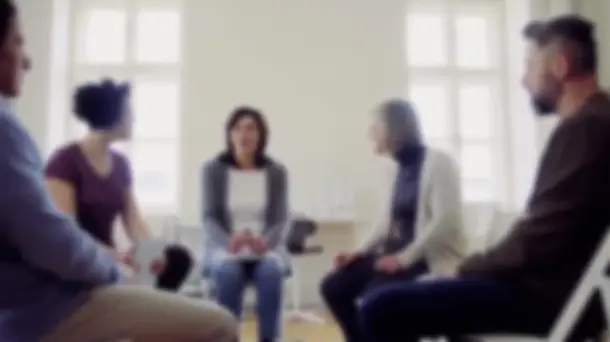Welcome to Narcotics Anonymous
What is our message? The message is that an addict, any addict, can stop using drugs, lose the desire to use, and find a new way to live. Our message is hope and the promise is freedom.

“When new members come to meetings, our sole interest is in their desire for freedom from active addiction and how we can be of help.”
It Works: How and Why, “Third Tradition”
Is NA for me?
This is a question every potential member must answer for themselves. Here are some recommended resources that may be helpful:
Need help for family or a friend?
NA meetings are run by and for addicts. If you're looking for help for a loved one, you can contact Narcotics Anonymous near you.
Subscribe to NAWS Emails
Sign up to receive Just for Today and SPAD daily meditation emails, as well as NAWS News, NAWS Updates, and more.
Never before have so many clean addicts, of their own choice and in free society, been able to meet where they please, to maintain their recovery in complete creative freedom.
Basic Text, “We Do Recover”
Recovery Quicklinks:
Service Quicklinks:
Narcotics Anonymous sprang from the Alcoholics Anonymous Program of the late 1940s, with meetings first emerging in the Los Angeles area of California, USA, in the early Fifties. The NA program started as a small US movement that has grown into one of the world's oldest and largest organizations of its type.
Today, Narcotics Anonymous is well established throughout much of the Americas, Western Europe, Australia, and New Zealand. Newly formed groups and NA communities are now scattered throughout the Indian subcontinent, Africa, East Asia, the Middle East, and Eastern Europe. Narcotics Anonymous books and information pamphlets are currently available in 49 languages.
Information About NA
Daily Meditations
Just for Today
February 04, 2025 |
Feeling good isn't the point |
| Page 36 |
| “For us, recovery is more than just pleasure.“ |
| Basic Text, p. 43 |
| In our active addiction, most of us knew exactly how we were going to feel from one day to the next. All we had to do was read the label on the bottle or know what was in the bag. We planned our feelings, and our goal for each day was to feel good. In recovery, we're liable to feel anything from one day to the next, even from one minute to the next. We may feel energetic and happy in the morning, then strangely let down and sad in the afternoon. Because we no longer plan our feelings for the day each morning, we could end up having feelings that are somewhat inconvenient, like feeling tired in the morning and wide-awake at bedtime. Of course, there's always the possibility we could feel good, but that isn't the point. Today, our main concern is not feeling good but learning to understand and deal with our feelings, no matter what they are. We do this by working the steps and sharing our feelings with others. |
| Just for Today: I will accept my feelings, whatever they may be, just as they are. I will practice the program and learn to live with my feelings. |
A Spiritual Principle a Day
February 04, 2025 |
Courage in the Face of Self-Doubt |
| Page 36 |
| “There are times when we must find the courage to be the lone voice on an issue or stand up for principle against a strong majority.“ |
| Guiding Principles, Tradition Two, Opening Essay |
| Tradition Two reassures us that, as individual members, we don't need to have all the answers. But sometimes we do have an answer to an issue that comes up in our group, and we're sure it's the right one. It's well thought-out. It's aligned with our Traditions. Its airtight adherence to our primary purpose of carrying the message is sharp as an axe blade. It's undeniably the right answer–except no one else seems to view the issue the way we do. The group's conscience seems to be veering away from logic, principles, and the spirit of NA. So, do we go with the flow or make waves? When we were using, many of us lived by the old standby “go along to get along.” Even though we may not have agreed with what was being said or done by those around us, we lacked the courage to stand up for ourselves, our beliefs, or other people. Working a program helps to reveal what our convictions are and how they're aligned with NA's. In a group situation where going with the flow might be the easier choice, we, first of all, check our motives honestly to make sure we're driven by our common welfare and not our ego. We ask our Higher Power to help us find our voice, shaky as it might be in the face of a strong majority. Courage is the strength to stand up for what we believe in. Courage helps us beat back self-doubt and fears of disappointing or angering others. It keeps us engaged, even open-minded, when our “right” answer is, in the end, sidelined by the majority. Humility can steady us, no matter which way it goes. And, once we find the courage, we can continue to be emboldened to keep using our voice and standing up for principles, while inviting in a Higher Power to influence our group decisions and staying out of the result. |
| ——— ——— ——— ——— ——— |
| I ask for the strength to practice courage to change the things I can. I know what I believe in and will have the courage to stand up for it–and the willingness and humility to accept the outcome. |
Do you need help with a drug problem?
“If you’re new to NA or planning to go to a Narcotics Anonymous meeting for the first time, it might be nice to know a little bit about what happens in our meetings. The information here is meant to give you an understanding of what we do when we come together to share recovery…”
Subscribe to NAWS Emails
Sign up to receive NAWS Updates and NAWS News emails as well as Just for Today and SPAD daily emails.



